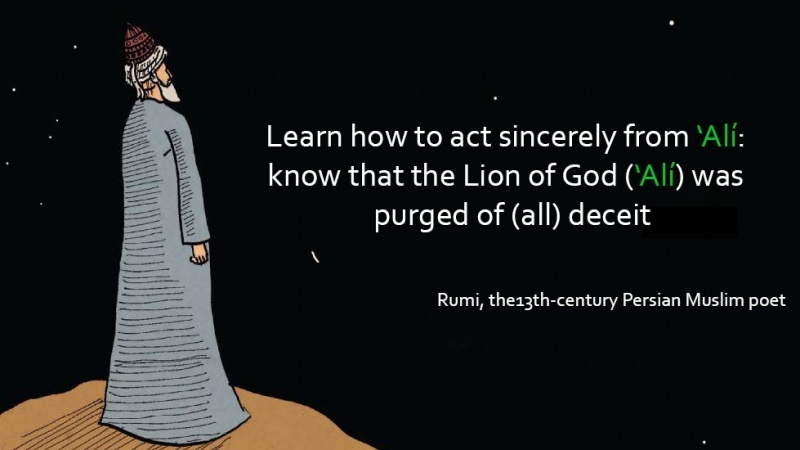Beautiful descriptions of Farsi language poet and sage, Mowlavi Rumi, on Imam Ali (PBUH)
Pars Today- Mowlavi's descriptions of Imam Ali (Peace upon him), the successor of the Prophet of Islam, in Diwan Shams, are mostly based on the divine power of this effective personality in self-sacrifice beside the Prophet.
Jalaluddin Mohammad Balkhi, the great poet and sage of Farsi language who is also known as Mowlana and Mowlavi, is famous as Rumi beyond the domain of the Iranian culture. He was born in 604 AH (13th century AD) in Balkh of the ancient Iran (present day Afghanistan).
His references to the verses of the Qur'an and the narrations of the Prophet of Islam and Imam Ali and the stories of other prophets surpass others in terms of quantity, especially in his Masnavi (book of couplets).
His meeting with Shams Tabrizi kindles fire in him
The most important event in the life of Mowlavi was his meeting with another great Iranian sage, Shams Tabrizi around 642 AH when he was nearly 40.
Jalaluddin was so much fascinated by Shams that he left lessons and preaching and was engaged in Sama (meditation) and composing zealous mystic poems. Nobody knows exactly what Shams had told and taught him to change him to that extent. But, it is clear that Shams was a learned sage with high mastery of the Qur'an and mysticism.
Mowlavi Rumi has influenced people beyond the borders of the Iranian plateau. Iranians, Afghans, Tajiks, Turks, Greeks and Muslims of Central Asia and Southeast Asia, especially Indonesia and Malaysia, have been greatly impacted by the spiritual heritage of Rumi.
The translation of the poetry of Mowalvi, famous as Rumi in the West, are known as the works of the "most popular" and "bestseller" poet in the United States. His works are read widely across the great Iran.
Commander of the Faithful in Diwan Shams
Mowlavi's descriptions of Imam Ali (Peace upon him), the Infallible Successor of the Prophet of Islam, in Diwan Shams, are mostly based on the divine power of this effective personality in self-sacrifice beside the Prophet. Mowlavi, also, has described knowledge and wisdom, and Imam Ali (Peace upon him) as a perfect man.
The lines below have been chosen from Diwan Shams in this regard:
My heart is weary of these weak-spirited co-travelers,
The Lion of God and valorous Rustam are my desire.
Lion of God is one of the epithets of Imam Ali (Peace upon him).
Though the reed is hollow, it is not left without song,
Follow the Lion 'n' lion-hunter, as with Ali you're strong.
Meaning: Follow Imam Ali as he is like a lion.
No use if you steal staff from Moses,
Haidar's arm you need to take Zulfaqar.
Meaning: appearance is not enough to guide people; one should rather be a perfect man like Ali.
Every love, every grace, every power every vision,
have perished, while Ali Mortaza is alive.
Imam Ali (Peace upon him) is a perfect man in love, grace and power.
The Commander of the Faithful in the book "Masnavi"
Mowalvi is very skillful in his book Masnavi. When he describes Imam Ali's combat with a fighter from among the oppressors, his poem becomes so lofty and fervent as if he has forgotten the story and is enthralled with Imam Ali's characteristics.
From Ali learn sincerity of deed,
Expurgate God's Lion from fraud indeed.
Once, Imam Ali finds the opportunity to kill the fighter of the faithless and oppressive troop, the fighter spits on the face of Imam Ali. Imam Ali (Peace upon him) immediately drops the sword and hesitates for a few moments to let his anger subside, as he does everything purely for God and does not want to mix his intention with anger. He doesn't want to fight for revenge.
He spat at the face of Ali,
the honor of every apostle and Wali.
He spat at the face for which the moon in sky,
humbly bows down, no matter how it is high.
Then, Mowlavi, quoting the faithless fighter and indeed speaking on his own behalf, describes Imam Ali with lofty phrases, metaphors and similes:
As in valor, God's Lion you are,
As in chivalry, who knows who you are?
....
In chivalry, you are like cloud over Moses in Sinai
....
O Ali, o incarnation of wisdom and insight!
Utter some of what you've seen day and night.
Sword of your patience destroys our soul,
Water of your knowledge cleans our soil.
Say, I know these are secrets of the upper world,
Since, as a habit he kills without sword.
....
Your eyes have learnt from the Unseen,
....
Expose the secret, o Ali Mortaza!
....
You shine voicelessly like the moon,
....
As you are the gate to that city of knowledge (city of knowledge means the Prophet of Islam)
As you are the bean of the sun of patience.
....
Be open forever, o gate of mercy.
In continuation, Mowlavi returns to the story after many allegories, and this time, he describes Imam Ali by himself as the Imam explains the reason for his hesitation in the combat:
"I strike sword for God's sake!" said he.
"I'm God's servant not my body's", said he.
"I'm God's Lion not my desire's", said he.
"My deed is witness to my faith", said he.
....
"For me everything is naught save God", said he.
....
"Like my sword, I'm full of gems", said he.
"In combat, I revive not kill", said he.
Sources: Tehrani, Tahereh, 2024. The Commander of the Faithful in Mowlavi's poetry. Mehr news agency, Mowlavi, Jalaluddin, Diwan Shams of Mowlavi, Jalaluddin. Masnavi
Key phrases: who is Imam Ali? who is Mowlavi? where was Mowlavi from? Mowlavi's poetry, language of Mowlavi's poetry, successor of the Prophet of Islam
RM/ME



